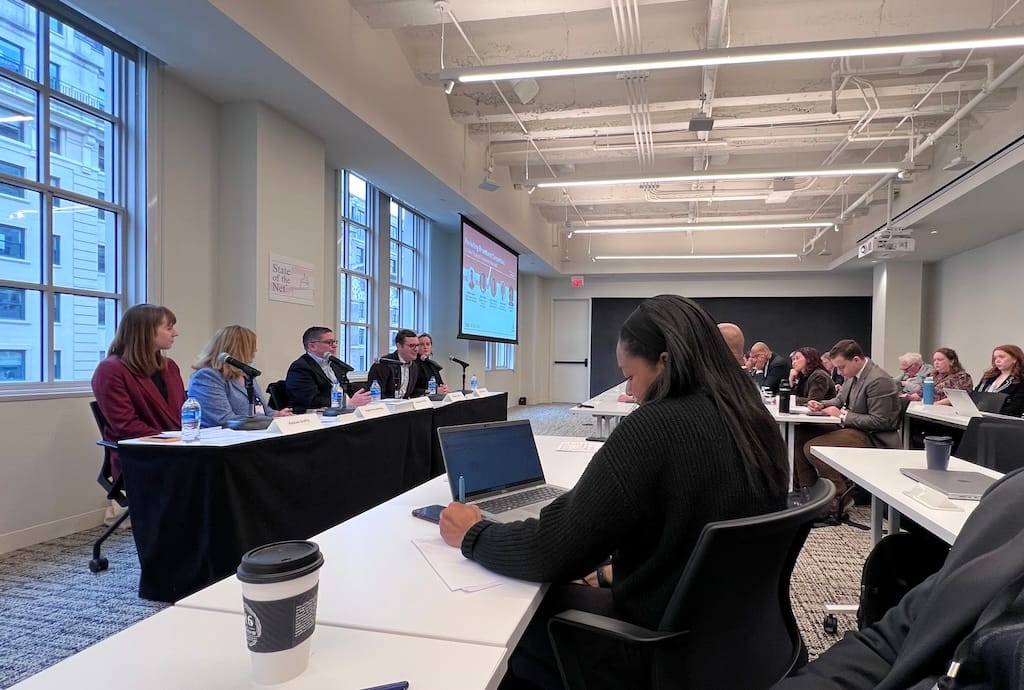Former FCC Commissioner Predicts Court Battle Over BEAD’s Fiber Preference
But Kathryn de Wit of Pew said the structure of BEAD was carefully crafted to address systemic flaws in federal broadband policy.
Jericho Casper

WASHINGTON, Feb. 13, 2025 – The Biden-era national broadband expansion program could face major rewrites, one expert said at the State of the Net event on Tuesday. The panel highlighted intensifying debates over the fate of fiber.
Former FCC Commissioner Michael O’Rielly predicted, referring to administrative guidelines established under Biden for the $42.5 billion Broadband Equity, Access, and Deployment program: “Most of the extras [will be] going into the garbage – extra policies, add-ons, union pieces. A bunch of them [will be] gone, in my opinion.”
“And then the question is, what do you do with [the program’s] fiber preference? There's definitely fans of dumping it who have a large voice in this administration,” O’Reilly said. Senate Commerce Committee chair Ted Cruz, R-Texas, told Broadband Breakfast last week to expect changes to specifically the program’s preference for funding fiber infrastructure.
O’Reilly suggested that a legal battle over fiber requirements could be looming as he and others have said it may “violate the statute” of the Infrastructure Investment and Jobs Act, which allocated the funding for the BEAD program.
“Do you want to spend time in court on that?” O’Reilly asked, referring to the fiber preference. “The way D.C. is going, I could see the administration saying, ‘Hey, we’re going to play this out. We’re not for the timid or the weak.’”
However, not all panelists agreed that the Biden-era policies should be dismantled.
Kathryn de Wit, director of the Broadband Access Initiative at The Pew Charitable Trusts, emphasized that the structure of BEAD was carefully crafted to address systemic flaws in federal broadband policy.
“There's a reason why Congress put all of these requirements in statute, and that has been documented by Sen. Cruz, the Government Accountability Office in several reports, as well as other members of Congress,” de Wit explained.
A 2023 GAO report identified 25 broadband-specific federal programs and more than 100 additional funding initiatives that could support broadband in some capacity. While agencies have taken steps to limit duplication, varying statutory requirements, definitions, and deadlines often make it difficult for applicants to navigate the system.
“I'm not saying that every step of the Biden administration took was correct or should be continued moving forward,” de Wit said. “But it has taken this long to get to this moment because Congress asked states, the National Telecommunications and Information Administration, and other federal partners to use this time to clarify and, quite frankly, fix some pretty significant flaws that have stood in the way of deployment and effective use of funds,”
Angie Kronenberg, president and CEO of Sligo Solutions and former president of the advocacy group INCOMPAS, advocated for preserving BEAD’s fiber preference. Fiber remains the foundation of modern broadband infrastructure, she said, and should be prioritized accordingly.
“When Congress was negotiating the BEAD program, they knew that the United States was drastically behind [other countries] in [investments in] fiber technology,” she said. “Fiber technology feeds every other technology, from wireless to satellite, we knew that we needed to encourage as much fiber out there as possible.”
At the same time, Kronenberg acknowledged that Congress built flexibility into the program to account for cost challenges and hard-to-reach areas. “We need to strike a balance — ensuring efficiency while recognizing that we cannot afford to fall behind the rest of the world [on broadband infrastructure],” she said.
“This is a once-in-a-generation investment. We are never going to get this kind of money out of Congress again,” Kronenberg said, maintaining the program’s focus should be on getting scalable technology deployed as quickly as possible. “Let's be smart about it, and then let's get it done.”
Also speaking on the panel was Nathan Leamer, CEO of Fixed Gear Strategies. He criticized regulations, including digital discrimination rules promulgated by the Federal Communications Commission under Biden, as well as Occupational Safety and Health Administration rules on heat exposure that required broadband towers erectors to unreasonably climb down towers, only to have to climb back up.









Member discussion